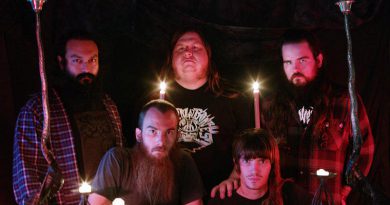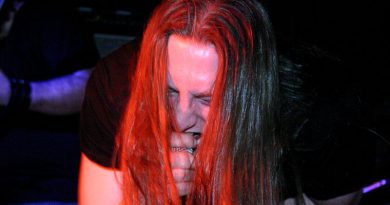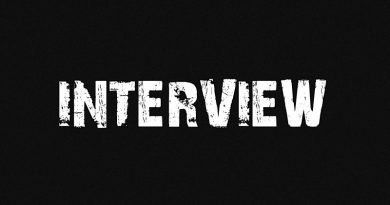In Search Of Tone: Jake Lindsey Of Book Of Wyrms
There are always tangents in my interviews and in this case Jay ‘Jake’ Lindsey of Book Of Wyrms I started the interview with one. We talked a bit over messenger, but this was the first ‘face-to-face’ meeting and he is a super cool guy to talk to. We weaved through topics to finally arrive at what we were meeting for. To discuss Book Of Wyrms and the incredible music they create.
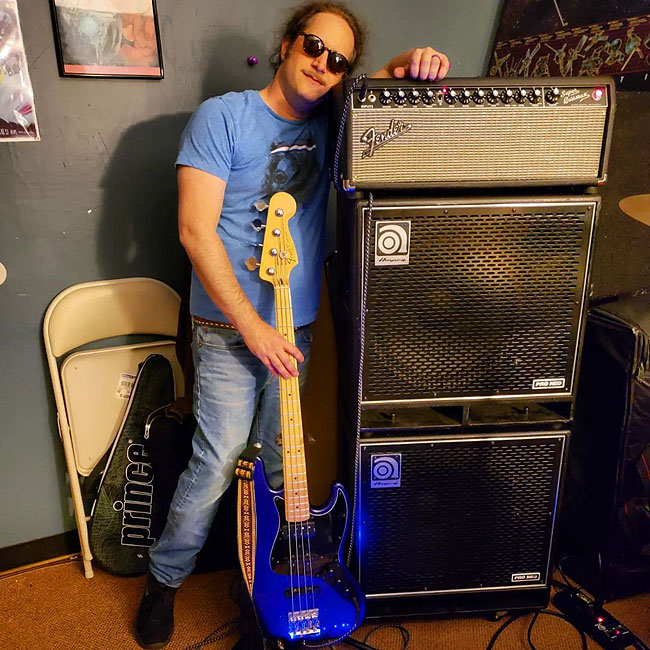
The band released their newest album Occult New Age last year through Desert Records and it has made some waves through the community. I was fortunate to sit down with Jake who plays bass and learn how the music was created. Jake has a unique perspective on the bass guitar and shares some valuable information that I hope you enjoy reading below.
I would also like to add he has tremendous patience as my children interrupted the interview because someone was at the door as well as various technical issues along the way… Thanks Jake!
Thanks for meeting with me! This is exciting. Let’s start with bass guitars and can you tell me a little about the ones you have?
I have several but my main go to is my purple Fender Jazz. It’s Mexican and I got it used in 2004. It was fretless which I thought I would like but it turned out to be really frustrating. I got a rosewood replacement neck with frets, and it was OK. I used that for a while, then eventually, I upgraded and got a Fender maple neck for it. It’s barely the original bass anymore [laughs]. I replaced the pickups with DiMarzio Ultra Vintage and then I wired those in series. One pickup is wired into the other pickup instead of both hitting the jack at the same time. The result is it’s hotter and louder because things in series have lower impedance. It also makes the sound a little darker due to the longer wire. That’s the idea behind the curly guitar cables. It provides a longer cable causing the signal to lose some treble and give it a more vintage darker tone.
my main go to is my purple Fender Jazz…
Wow, I didn’t know that’s why people used those cables.
Yeah, it’s little things to help improve the tone. The DiMarzio are two of the pickups and the other is a Nordstrand which is supposed to be like a P Bass pickup, but a little hotter and I had a luthier cut a hole by the neck because I’m addicted to the neck pickup sound. I have that running in parallel to the other two that are in series, and I use all three pickups at once. I use that bass on pretty much everything.
I have a really nice Godin bass that I use for recording often. It has a neck pickup and a maple neck, which I learned the hard way that I need. Some people say it’s a negligible difference, but I feel I can hear and feel the difference when using a maple neck. Those are the two main basses, but I’m going to show you this third one, it’s a Squier Bronco. Chicago Music Exchange had this exclusive pink one. I thought it was the coolest bass ever, so I bought it. The original pickup wasn’t great. It’s a Strat pickup so it didn’t line up right with the four bass strings. I replaced it with the DiMarzio Cool Rail because it’s a little less loud. It’s short scale too. The other basses are tunes to C and this one is E or Eb.
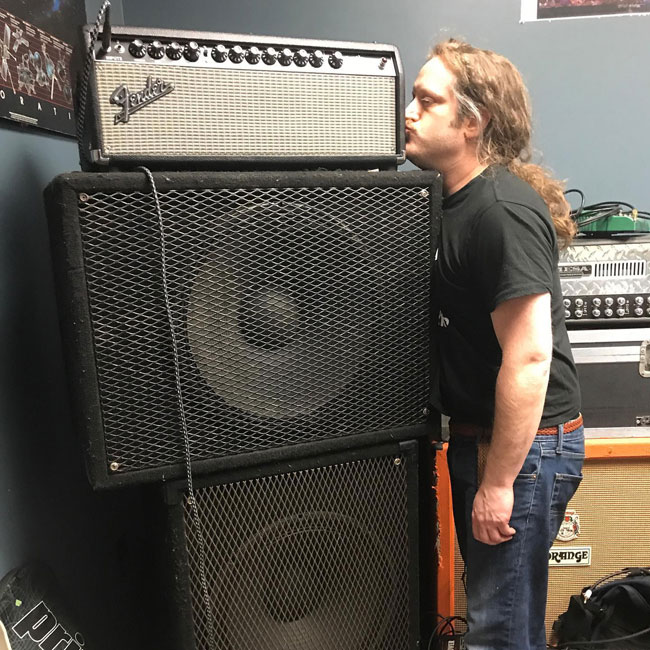
My guitars are tuned to E or D. I’d like to tune it to B or C but the strings are too loose, and I need to get them set up.
Yeah, that’s why I don’t tune my bass up from C and use the short scale for that because those basses are set up for the low tuning. I also use flat wound strings. They have more tension, and they are smoother without giving that finger scrapping noise.
I really need to try those type of strings, I’ve heard a lot about them and this is the first time for bass! What amps are you currently using?
That’s been a journey. Right now, I have my Fender Super Bassman 300W all tube head. You can compare it to an SVT or Sunn that are 300 watts as well. It’s really big, it’s really heavy and the way I ended up with it is I used to use a Bassman 500, which is a tube preamp, and then a Solid State Class D power section. I still have it, it’s great and weighs 8-10 pounds. It was convenient to tour with and sounds good, but I felt like there was an amp that sounded better. That’s the Bassman 300. It sounds amazing but its heavy. It’s not as heavy as an SVT so I’m complaining needlessly [laughs]. It’s really loud and I don’t go above 4. If I go to 6 someone will complain, not the band but the sound guy will usually say you can come down a bit [laughs].
Right now, I have my Fender Super Bassman 300W all tube head…
It has 2 channels and I use it on the overdrive channel. I used to use 2 x 18 inch SWR Big Ben speakers. They are really good but a bit heavy and take up a lot of room in the van. I loved them though because they sounded great. I did however find Ampeg 15 inch speakers. It’s two separate cabs and they take up way less room than the 18 inch speakers, and weigh about half because of the speaker size and magnet difference. They may even be louder than the 18s. I plugged them in for the first time and everything was set to my old settings, and it was too much, which is good. On top of that, everyone in the band began complimenting me on the tone. I didn’t realize how much detail was missing because you get used to a certain sound, but I’m very happy with the Ampeg’s.
You mentioned using the overdrive channel. Do you have your bass tone more overdriven then clean?
Yeah, it’s not too crazy. I have the gain setting at 5 and my bass pickups are hot so it’s slightly more distorted. I would say I’m just a little cleaner and a bassier than Lemmy. That’s changed a lot though. We used to have two guitarists so I would be a lot cleaner, and I wanted to be out of their way. With one guitar it’s entirely different. I feel like I had to be more guitar like to blend in. Otherwise, there was a distinct separation in instruments, and I wasn’t a fan of that sound. I think in really good rock music you’re not sure what is the guitar and what’s the bass so I used more gain because of that.
For a chorus, or if I’m trying to do a solo, I have a Germanium Overdrive pedal. At that point, I’m stacking different overdrives. It’s different from what I used to do, where I would use a fuzz into a clean amp. It’s all personal preference.
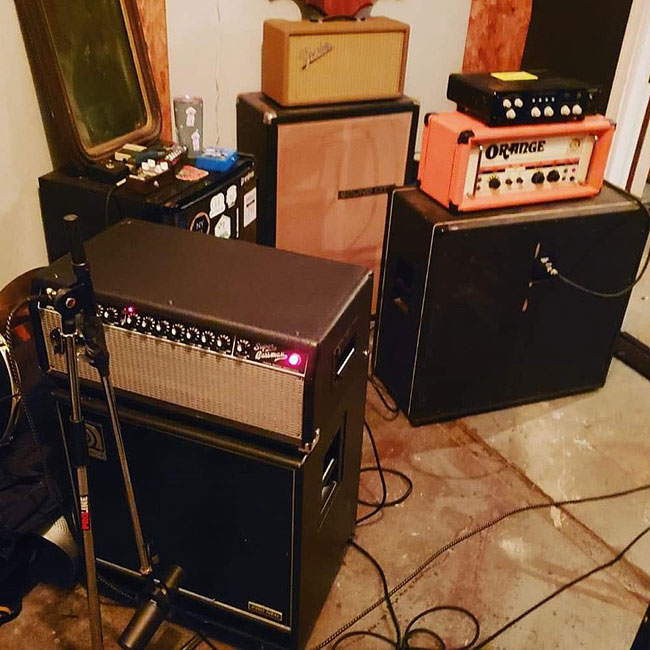
I think all your ‘little’ adjustments translate well to the listener. It can be heard on the new album and sounds great. I have trouble picking out bass vs guitar often, but I can hear your bass riffs and it sounds really good.
Thanks for that, it takes time getting the tones how you want and if you’re going to be upfront when playing, you need to almost outwork everybody and it can’t be those same boring basslines. I did take lessons in preparation for this album. I had lessons as a kid at college but not for a long time since then. I felt like I hadn’t advanced in a while. I got this really good bassist from here, Todd Harrington, to give me lessons. I think he’s played bass for Billy Strings at some point too. He really kicked my butt [laughs]. He had me on a strong soul and jazz routine to get my technique better. With only 2 stringed instruments, my question was how do I keep the low end but also add melody and a solo. The answer was obvious, ‘70s funk and jazz. Plus, most of these men and women playing bass back then were playing in e minor so it all translates well.
Another important thing I learned, and it took me forever to figure it out, but the less low end you have in the bass, the louder the engineer can turn up the volume in the mix. Also, the bass drum is going to take up some of the low end real estate. If you were to play Michael Jackson’s Thriller bass track solo, you would hear there isn’t much low end, that’s why it’s so loud in the mix.
We use a lot of dynamics in the band and like different gain stages to build the intensity, the MXR Phase 90 Mini helps with that…
That’s interesting. I would have assumed the bass needs to have treble down and bass at 10 [laughs]. Do you use more than just the Germanium Overdrive as far as pedals?
Yes, but I don’t have a very big pedalboard. I used to have the smallest Nano pedalboard you can get, but I went up 1 size. Part of that is, as a bassist, I’m not really using much, but also if something goes wrong, its less to struggle with figuring out which pedal stopped working and why. I’ve seen bands with say 24 pedals and it takes a long time figuring that out. So, for those reasons I keep it minimal. I have a Wah pedal, which I use as a normal Wah, but it also has a volume output knob. I use it as a slight volume boost as well. Then, the Germanium Overdrive is next. After that I have a MXR Phase 90 Mini which I use occasionally. I also use that with distortion, and it gives another stage of distortion.
We use a lot of dynamics in the band and like different gain stages to build the intensity, the MXR Phase 90 Mini helps with that. After that I have a MXR Carbon Copy, which is weird for a bassist, but I use it more on ambient spacey stuff and solos. Last in the chain, and maybe the most interesting, is an MXR Chorus pedal. I also always have it on. It’s set to the slowest setting and thankfully it has a wet dry blend which I keep in the middle. I learned that from a Zakk Wylde interview where he described using one to get a much thicker sound.
** Insert tangent about how I want to buy gear after every interview and how he’s made me want to try a chorus pedal while testing Jake’s amazing patience again as my zoom meeting cuts off **
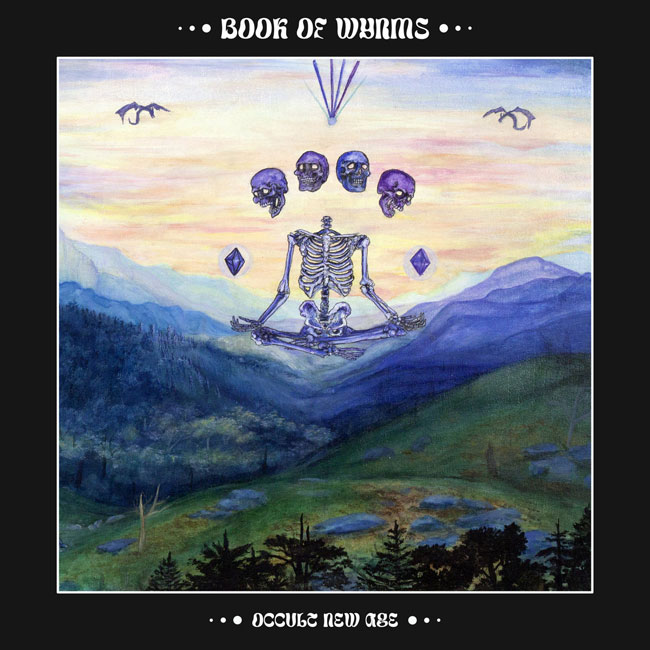
And we’re back, sorry… Can you tell me a little about the songwriting process behind Book Of Wyrms?
It used to be more jam based with the first record but it has changed because people got busier and less time between albums. Now Kyle [Lewis – guitar] and I tend to write more at home. It’s also easier to have an idea of how the song will progress going into the studio. We can jam but then it can be hard to decide where the song will go. I think it’s better to present ideas in any medium that are further along.
With the second record and more so with the most recent record, I was coming in with verse, chorus, verse chorus, and a general layout. The other reason it’s better to have a plan is, how are you going to show someone your song if you don’t have it down yourself. I like to show the songs after I have it down flawlessly. With that said, I also don’t write other members parts. I just say this is what I’m doing for the verse, chorus etc and let them write their parts in. I think it’s important for everyone else to write their own parts because Sarah is a better singer than I am, Kyle is a better guitar player, and Chris is a better drummer. They will create a more interesting part. I can play the bass and the song will be built up around what I bring. It allows all of us to think about how to play for the song, instead of writing fancy parts to show off.
I think it’s important for everyone else to write their own parts because Sarah is a better singer than I am, Kyle is a better guitar player, and Chris is a better drummer…
I like how you said that. I’ve heard that many times, it’s about playing for the song, and it creates much more interesting better music that way.
Exactly, that’s one of the biggest struggles I have. I’ll write a bass line and I’ll think ‘you’re better than that, why aren’t you challenging yourself and writing something more difficult.’ I have to check myself and remember it’s not to show off skill but to write for the music.
This is exactly how I write (or don’t write) music, I constantly think it’s too simple it can’t be good.
That’s where the magic happens I believe. Think about some of the greatest hits and also the coolest riffs you can think of. They are usually very simple. That’s where I think the magic happens, to be able to say ‘no I don’t need to change that, its good.’ I think it’s important to record it as soon as you play it because everyone will eventually cave into trying to make it ‘better’.
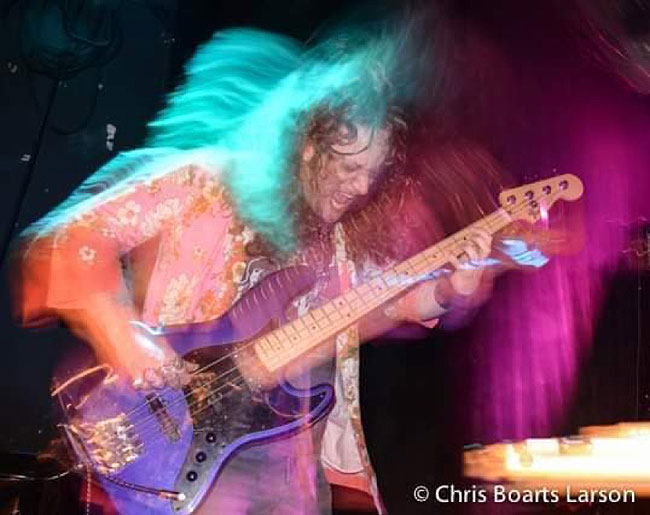
How do you approach writing riffs?
If we are dealing with chords, then I will play in C, knowing F is coming next, and everything I’m doing is leading me to F. I’m constantly thinking ahead to the next chord. That’s totally different than writing a riff. I could sit around playing bass all day and nothing will come of it. Once in a while something good may grab my attention and I try and hang on to that idea. I’ll usually take that riff, play it a second time with a slightly different ending, play it in the original way, and a fourth time with another different ending and now you have an idea that has evolved a little bit. It’s really hard writing from scratch so I’ll put on a drum machine to have something to help.
I’ve been listening to Book Of Wyrms a lot more lately and I really like Sourwolf. That has stood out to me a lot recently.
Thank you, that was a pretty early song we wrote. That was very intentional, and I want it to be a big long epic riff, the entire verse is essentially the riff. It builds up with intensity as I play the same riff by adding distortion. That’s a very good example of what I was talking about earlier with writing riffs.
That track [Hollergoblin] was hard to write and I had many ideas I was trying to fit together, it didn’t really come alive until we started jamming it.
It’s a great song and to follow on from that, what songs are you particularly proud of?
Usually what I’m currently working on is the most exciting. But there are songs we wrote that I love. Blacklight Warpriest off Remythologizer I really like. I like the groove and how its slow but picks up at the end. For similar reasons I like Hollergoblin off the new record. That track was hard to write and I had many ideas I was trying to fit together, it didn’t really come alive until we started jamming it. My bass lessons helped a lot for this song as well.
Another one I’m really proud of is Colossal Yield. I didn’t write it. Kyle did and he was playing the riff when I came in the room, and I said ‘we need to do something with that’. I’m proud of that because it was a lot of people’s favorite song and up until then, I was feeling a lot of pressure to be the main riff writer for the band. It was then I was able to ease up and relax knowing we can work as a team and write great songs.
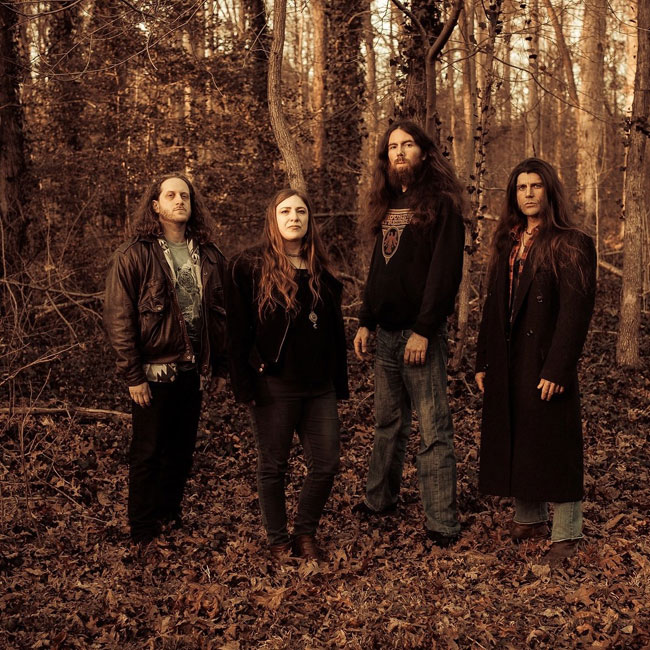
What are you listening to these days?
These days! I go through some weird phases but recently we’ve been listening to a lot of Kiss and Dio are the big ones that are always on. Rainbow is another. I listen to Seventh Son Of A Seventh Son by Iron Maiden every Friday at work because I’m really tired and the only thing that consistently gets me through it is Iron Maiden. We try and listen to everything. I listen to a lot of hip hop. Sarah is a big Anderson .Paak fan and I listen to Kendrick Lamar and some dub reggae because it’s relaxing. I am in the metal community so I like to keep my eye on things and listen to friends band. Do you know Geezer.
I also listen to a lot of Motörhead and Hawkwind because of Lemmy…
Yes… actually because I think you just posted something about them.
Yes, I did. Geezer and Gypsybyrd both put out records recently that are cool. Bolt Thrower and Brutal Truth I’ve always listened to. I recently got into Poison Ivy and Dead Moon. It’s outside of my comfort zone and I’m not really a punk rocker but I’ve enjoyed those bands and it’s a bit different to the punk I’ve heard. I am rediscovering ‘70s AC/DC Powerage is just an awesome album. Not super exciting answers with cool obscure bands.
It’s the classics, gotta love them.
Yes! It’s just great music. I also listen to a lot of Motörhead and Hawkwind because of Lemmy.
** We ended this fantastic interview with another long tangent and Jake helped me with some questions I had with my own bass gear. We could have talked forever but we did manage to finish up before zoom cut me off again… **
Book Of Wyrms latest album, Occult New Age, is out now via Desert Records.
Label: Desert Records
Band Links: Facebook | Bandcamp | Instagram
Interviewed by: Josh Schneider

